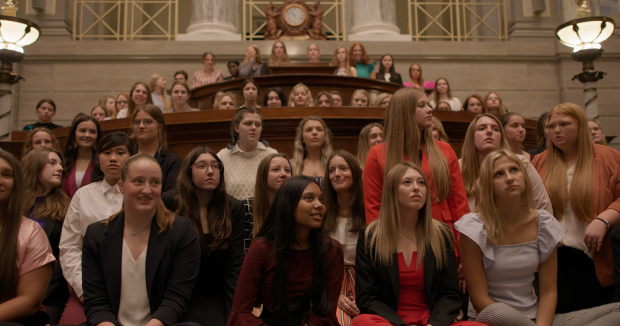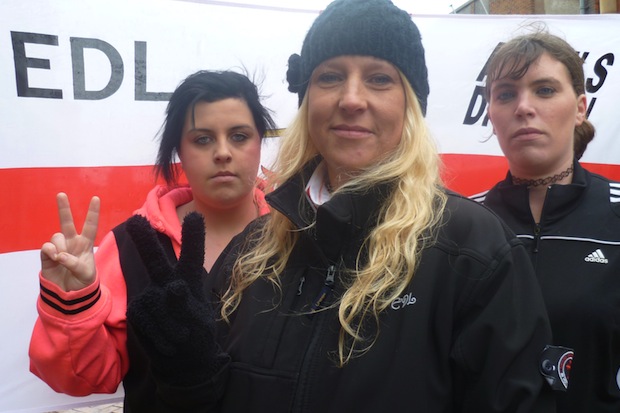Will the women on ITV’s The X Factor (Saturday) stop perving? I suppose there are two ways to tackle the issue of gender equality — one is to dictate that nobody mention sexuality at all; the other is to make females slobber over the males the way men purportedly slobber over women all the time. The women judges of The X Factor are lurching towards the latter. ‘I’ve got my eye on you,’ Sharon Osbourne winked at a contestant, Nicholas McDonald. He is 15. She made him repeat the words ‘nearly sixteen’, because he pronounced it ‘sex-teen’. Young Nicholas is being sexualised before our eyes. ‘Tonight’s the first night I noticed those baby-blue eyes of yours,’ cooed ex-Pussycat Doll Nicole Scherzinger, rallying the ladies in the audience to agree with her.
Male judge Louis Walsh got in on the act last week, when the theme was love songs. Little Nick is so young he’s never fallen in love, and Louis was worried he may not deliver a romantic ballad with sufficient frisson. He got sexy Nicole to drop in on a practice session to ‘inspire’ the lad. She hugged him. Imagine if a man had been roped in to do this to a teenage girl contender! When Nicholas performed his song on stage — ‘She’s the One’ — he was surrounded by leggy female dancers, and the act ended with a sultry temptress sidling up to him. Even Osbourne said she was shocked. (Though her comment that the temptress-dancer was a ‘paedophile’ may have been going too far.)
TV is the home of moral ambiguity. It’s a soapbox for people to express political and social views, but its visual aspect means looks and sex are paramount. Plunging bravely into another ethical faultline was BBC2’s Ambassadors (Wednesday), which is about foreigners in a little-known Central Asian nation. Borat! I hear you exclaim. But this three-part comedy drama is not a politically incorrect gag fest. It stars the comic duo David Mitchell and Robert Webb, and appears to be aiming to fit in some thoughtful messages about foreign policy. Mitchell plays the British ambassador to a sandy republic called Tazbekistan who has to deal with arms and business deals, desert despots, self-absorbed western activists, and peculiar local customs. Webb plays his diplomatic deputy who’s engaged in dodgy sidelines. As an X Factor judge might say, there were pitching problems.
The first episode struggled for a consistent tone. Mitchell appeared to be the only funny man in the show — by which I don’t mean that he was the only actor who managed to make us laugh, but that he was the only person who seemed to be starring in an absurdist comedy. The other actors inhabited a straight-up drama that just happened to have amusing lines in it. Mitchell’s character romped around the wilds of Tazbekistan hunting, accidently shooting the mighty horned ibex, the beloved national animal. His pudgy face peeking out from under a cartoony deerstalker, he acknowledged looking like Elmer Fudd. The rest of the cast delivered wisecracks, but in the manner of, say, a smart-ass detective show. Webb’s worldly character, with his blackmail worries, wouldn’t have been out of place in a crime thriller.
Genres jostled with each other like expats at the bar of a far-flung Irish-style pub. The show’s desire for mild moralising also collided with its own premise. Yes, the programme is about consuls in an exotic locale, but we can’t have too many jokes about weird local practices, so let’s also make fun of British stereotypes. The result is a half-hearted scene of the Tazbek president carving up an ibex carcass and another of an imported English pork-pie festival. In the mix is some chit-chat about the deadly aspects of British helicopter sales. Still, I’m happy to say the second episode, which features a (fictional) royal dignitary, is more surefooted. Mitchell’s ambassador becomes less spoofy, and the programme gets into its stride of making points about the farcical nature of international relations.
Speaking of a moral morass — we now live in a post-rape Downton Abbey world. A visiting valet raped lady’s maid Anna. Women columnists voiced disgust at the use of rape as a plot device to boost ratings. Many claimed they would never watch Downton again, that Julian Fellowes had broken faith with their gentle Sunday-night viewing. But Fellowes once used no less than the first world war — that event that killed millions, mostly men — as a plot device. Not to mention the gratuitously violent way in which he killed off Matthew Crawley in a car crash — should drivers protest? Rape is heinous, but we do know that everything that happens on Downton is fiction, right? None of which changes the fact that the series is a truly dreary watch.
Got something to add? Join the discussion and comment below.
Get 10 issues for just $10
Subscribe to The Spectator Australia today for the next 10 magazine issues, plus full online access, for just $10.
You might disagree with half of it, but you’ll enjoy reading all of it. Try your first month for free, then just $2 a week for the remainder of your first year.














Comments
Don't miss out
Join the conversation with other Spectator Australia readers. Subscribe to leave a comment.
SUBSCRIBEAlready a subscriber? Log in